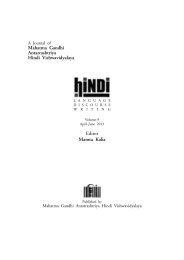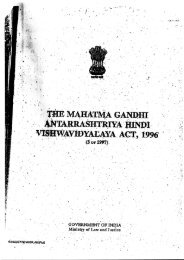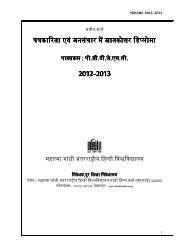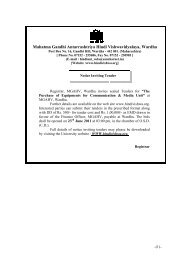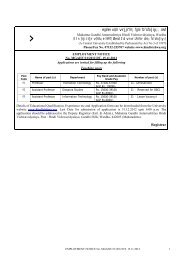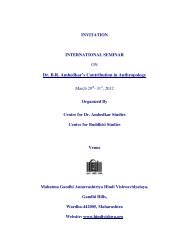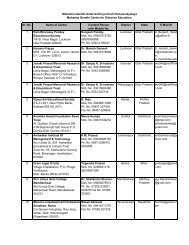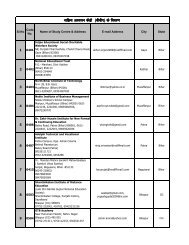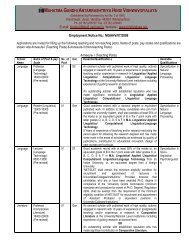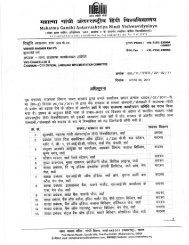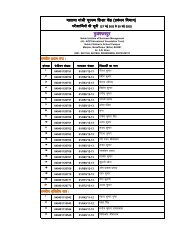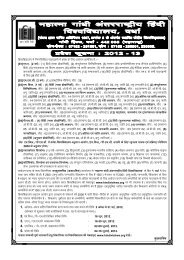A Journal of Mahatma Gandhi Antarrashtriya Hindi Vishwavidyalaya
A Journal of Mahatma Gandhi Antarrashtriya Hindi Vishwavidyalaya
A Journal of Mahatma Gandhi Antarrashtriya Hindi Vishwavidyalaya
Create successful ePaper yourself
Turn your PDF publications into a flip-book with our unique Google optimized e-Paper software.
their interest against the downtrodden <strong>of</strong><br />
the society. Premchand is in favour <strong>of</strong><br />
these downtrodden people. By<br />
characterizing Dhaniya Premchand keeps<br />
his faith in woman power. He also advocates<br />
live-in relation by depicting Mehta-Malti<br />
relationship. Malti is a doctor and Mehta<br />
is a pr<strong>of</strong>essor. They love each other but<br />
decide not to marry but to have a livein<br />
relation. Here Premchand clearly departs<br />
from Indian tradition and indicates the<br />
futuristic Indian urban society.<br />
Here it is worth mentioning Shekhar<br />
Ek Jeevanee (Biography <strong>of</strong> Shekhar/<br />
Agyeya/1940), in two volumes and<br />
Tyagpatra (The Resignation/Jainendra/<br />
1937). These two novels take a lead from<br />
Premchand and project changing Indian<br />
society in respect <strong>of</strong> position <strong>of</strong> women<br />
in man dominated Indian milieu. In my<br />
opinion Mrinalini <strong>of</strong> Tyagpatra is an<br />
extension <strong>of</strong> Dr.Malti <strong>of</strong> Premchand’s<br />
Godan. These two characters represent<br />
the changing mindset <strong>of</strong> women in India<br />
where they challenge the traditional<br />
husband-wife relationship. In Shekhar<br />
Ek Jeevanee also the novelist Agyeya<br />
creates a love relationship between Shekhar<br />
and his cousin sister which is no way<br />
acceptable in Indian society and this<br />
depiction has been criticized by many<br />
critics and they look upon it as vulgar.<br />
These two novels jolted the Indian mindset<br />
and became the torchbearer <strong>of</strong> new ideas<br />
and thoughts emerging in Indian society.<br />
These two novels are departure from<br />
Premchand’s novels in their narration,<br />
structure and style. Tyagpatra is written<br />
in the mode <strong>of</strong> autobiography. Shekhar<br />
ek jeevanee is a biography <strong>of</strong> a<br />
revolutionary in which the protagonist is<br />
writing his own story as a third person<br />
by fictionalizing it .So neither it is a<br />
biography nor autobiography <strong>of</strong> the<br />
protagonist. This novel is a search <strong>of</strong> a<br />
revolutionary’s mind and tries to depict<br />
how a revolutionary’s mind gets formated.<br />
In a way this novel is also influenced<br />
by India’s war <strong>of</strong> independence and<br />
particularly <strong>of</strong> revolutionaries like Bhagat<br />
Singh, Chandrashekhar Azad, RajGuru,<br />
Bismil and others. In fact this is a deep<br />
analytical story <strong>of</strong> a revolutionary who<br />
was waging war against the colonial rule.<br />
The urge for searching for a nation<br />
continues in <strong>Hindi</strong> novels even after India<br />
got independence on 15 th August1947.<br />
Maila Aanchal (Dusty terrain/<br />
Phanishwarnath Renu/1948), Aadha Gaon<br />
(The Village divided/Rahi Masoom Raza/<br />
1968), Raag Darbaree (Song <strong>of</strong> the Night/<br />
Shreelal Shukla/1968) are three prominent<br />
<strong>Hindi</strong> novels <strong>of</strong> early phase <strong>of</strong> India’s post<br />
independence era.<br />
These three novels depict the scenario<br />
in India after independence and problems<br />
faced in the path <strong>of</strong> making it a sovereign<br />
and secular nation that is envisaged in<br />
Indian constitution. The main problems<br />
faced by India as a Nation after<br />
independence are as follows:<br />
52 :: January-March 2012



